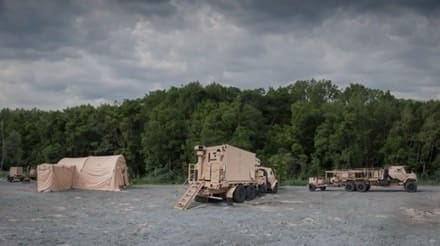HUNTSVILLE, Ala. — The Integrated Fires Mission Command Project Office, under Program Executive Office Missiles and Space, received the first complete Integrated Battle Command System delivery as part of the low-rate initial production on April 22, 2024.

Integrated Battle Command System, or IBCS, is the cornerstone of air and missile defense modernization efforts, providing transformational mission command with increased capabilities to the battlefield faster.
“The completion of this first delivery is the result of unparalleled dedication from amazing professionals. It has been a privilege to lead a team with such a high level of skill and commitment,” said Army Col. Chris Hill, IFMC Project Office project manager. “This accomplishment is an excellent example of what we can achieve when our military, industry partners, government civilians and contractors successfully collaborate on our mission.”
The Integrated Air and Missile Defense program was among the first Army efforts to enter the DOD agile software pathway process. Agile software development, coupled with warfighter prioritization and hardware development, has enabled faster adaptation to new capabilities and threats, ensuring increased consistency across all aspects of production. The program is at the forefront of the Army’s renewed vision of digital transformation.
IBCS is comprised of three major end items: the Integrated Collaborative Environment, the Engagement Operation Center and the Integrated Fire Control Network Relay. The ICE is a modular shelter that provides a collaborative environment for battlefield mission command. The EOC is an integrated fire control center that provides the engagement operations function for IBCS. The IFCN Relay performs dual functions, providing the interface for the adapted sensors and weapons and serving as a communications relay to extend battlefield operations distances.
“IBCS is the critical mission command component of our Army’s modernized air and missile defense capabilities. It is the cornerstone of our efforts to integrate future components and qualify the architecture within our annual Integrated Fires Test Campaign,” said Army Brig. Gen. Frank Lozano, Program Executive Officer Missiles and Space. “This delivery is the result of excellent work by the entire team focused on modernizing our air and missile defense systems while getting this equipment to our Soldiers as quickly as possible.”
The IFMC Project Office is helping to modernize the US Army by integration, synchronization and collaboration between all air and missile defense components. Integration efforts leverage legacy and future sensors and shooters, allowing for a single integrated air picture and coordination between fielded assets.
The fusion between existing joint systems and future developmental programs with IBCS increases overall effectiveness, dramatically enhancing the ability to track, identify, engage and defend against diverse threats. These capabilities not only help modernize the Army’s AMD capabilities, but also the capabilities of our allies across the globe who modernize to the new IBCS architecture.
By NATHANIEL PIERCE

